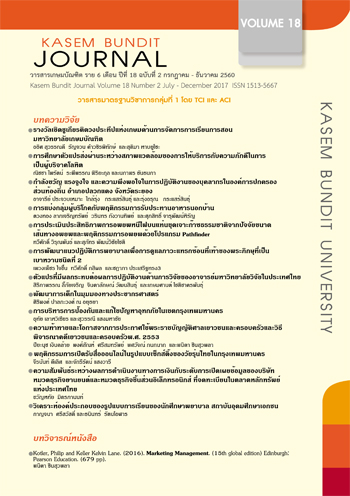การบริหารการป้องกันและแก้ไขปัญหาอุทกภัยในเขตกรุงเทพมหานคร
Keywords:
การบริหารการป้องกัน, ปัญหาอุทกภัยในเขตกรุงเทพมหานครAbstract
บทความการวิจัยนี้มีจุดวัตถุประสงค์เพื่อศึกษาปัจจัยด้านการบริหารที่มีอิทธิพลต่อประสิทธิผลการป้องกันและแก้ไขปัญหาอุทกภัยในเขตกรุงเทพมหานครในปี พ.ศ. 2554 วิเคราะห์อุปสรรคทางการบริหาร ตลอดจนนำเสนอแนวทางเชิงการบริหารในการป้องกันและแก้ไขปัญหาอุทกภัยในเขตกรุงเทพมหานคร งานวิจัยนี้เป็นการวิจัยผสมผสาน (Mixed Methods) ผลการศึกษาพบว่า ผู้มีส่วนได้ส่วนเสีย การประสานงาน การสื่อสาร การควบคุม ปัจจัยทางการเมือง และการมีส่วนร่วมของชุมชนมีความสัมพันธ์ทางบวกกับประสิทธิผลการป้องกันและแก้ไขปัญหาอุทกภัยในกรุงเทพมหานครอย่างมีนัยสำคัญที่ระดับ < 0.01 ส่วนอุปสรรคทางการบริหารได้แก่ การปราศจากหน่วยงานที่รับผิดชอบโดยตรงในเรื่องการจัดการอุทกภัย ไม่มีการจัดทำแผนแม่บท แผนยุทธศาสตร์เกี่ยวกับน้ำ ข้อเสนอแนะคือการป้องกันและแก้ไขปัญหาอุทกภัยต้องให้ความ สำคัญกับผู้มีส่วนได้ส่วนเสีย การประสานงาน การสื่อสาร การควบคุม ปัจจัยทางการเมือง และการมีส่วนร่วมของชุมชน และให้จัดตั้งองค์การถาวรเพื่อรับผิดชอบด้านน้ำโดยตรง
The objectives of this research were to investigate the management factors affecting the effectiveness of flood prevention and mitigation in Bangkok Metropolitan area, to analyze obstacles in flood management, and to propose management guidelines for flood prevention and mitigation. Mixed methods were utilized in the research of this study. The findings illustrated that stakeholders, coordination, communication, control, political factors and community participation were positively and significantly related with the effectiveness of flood prevention and mitigation management at p< 0.01. The obstacles of flood management comprised 2 main aspects – the lack of organization that played direct responsibility in flood management and the lack of flood management master and strategic plans. Recommendations included more focus on stakeholders, coordination, communication, control, political factor and community participation in flood management and the establishment of permanent organization to be responsible for flood management.
References
Bangkok Flood Prevention and Problem Solving Action Plan 2012 under the Authority of Department of Drainage and Sewerage, Bangkok Metropolitan Administration. Bangkok: WVO Officer of Printing Mill, War Veterans Organization of Thailand. (in Thai)
Calder, Ian R. 2006. “Forest and Floods: Moving to an Evidence-based Approach to Watershed and Integrated Flood Management.” International Water Resources Association. Water International. Vol. 31. No. 1. March.
Correia, Francisco Nunes, et al. 1998. “Flood Hazard Assessment and Management: Interface with the Public,” Water Resources Management. 12: 209-227.
Dawson, Richard J. et al. 2011. “Assessing the Effectiveness of Non-structural Flood Management Measures in the Thames Estuary under Conditions of Socio-economic and Environment Change ,” Global Environmental Change. 21: 628-646.
Department of Disaster Prevention and Mitigation, Ministry of the Interior. 2011. Department of Disaster Prevention and Mitigation Strategic Plan 2012-2016. (in Thai)
----------. Disaster Prevention and Mitigation Acts 2007 and Constitutions. (in Thai)
Division of Drainage and Sewerage Information, Department of Drainage and Sewerage. 2013. Bangkok Flood Prevention and Problem Solving Action Plan 2013 under the Authority of Department of Drainage and Sewerage, Bangkok Metropolitan Administration. (in Thai)
Dungumaro, Esther W. and Madulu, Ndalahwa F. 2003. “Public Participation in Integrated Water Resources Management: The Case of Tanzania.” Physics and Chemistry of the Earth. 28: 1009-1014.
Dymon, Ute J. 1999. “Effectiveness of Geographic Information Systems (GIS) Applications in Flood Management During and After Hurricane Fran.” Quick Response Report # 114. Kent, Ohio: Department of Geography. Kent State University.
Faisal, I.M., Kabir, M.R. and Nishat, A. 1999. “Non-Structural Flood Mitigation Measures for Dhaka City.” Urban Water. 1: 145-153.
Government of India, Ministry of Water Resources. 2002. National Water Policy. New Delhi. Online.
Khan, Mizan R. and Rahman, M. Ashiqur. 2007. “Partnership Approach to Disaster Management in Bangladesh: A Critical Policy Assessment.” Natural Hazards. Vol. 41, Issue 2. May, pp. 359-378.
Knight, Don et al. 1999. “Top Management Team Diversity, Group Process, and Strategic Consensus.” Strategic Management Journal. 20: 445-465
Lebel, Y. Louis, Nikitina, Elena and Manuta, Jesse. 2006. “Flood Disaster Risk Management in Asia: An Institutional and Political Perspective.” Science and Culture. Vol. 72. Nos. 1-2. January-February.
Middelkoop, Hans, et al. 2004. Perspectives in Flood Management in the Rhine and Meuse Rivers. John Wiley & Sons, Ltd.
Ogu, Vincent Ifeanyi. 2000. “Private Sector Participation and Municipal Waste Management in Benin City, Nigeria,” Environment and Urbanization. October.
Orr, Paula, Colvin, John and King, David. 2007. “Involving Stakeholders in Integrated River Basin Planning in England and Wales,” Water Resource Manage. 21: 331-349.
Quarantelli, E.L. 1990. Assessment of Development Potential and Capacity Based on Vulnerability: Integrated Approach to Disaster Management and Regional Development Planning with Peoples’ Participation. UN Center for Regional Development.
Royal Irrigation Department. Royal Irrigation Department Strategic Plan 2013-2016. (in Thai)
Smith, K. and Tobin, G.A. 1979. Human Adjustment to the Flood Hazard. London: Longman.
Technical Support Unit. Ed. The Associated Programme on Flood Management. 2003. Integrated Flood Management Case Study Bangladesh: Flood Management. World Meteorological Organization. Global Water Partnership. September.
Wolf, Aaron T. et al. 2005. « Managing Water Conflict and Cooperation, » State of the World : Redefining Global Security. The Worldwatch Institute.
World Meteorological Organization. 2008. Organizing Community Participation for Flood Management: A Tool for Integrated Flood Management. Associated Programme on Flood Management. March.
---------. 2003. Integrated Flood Management Case Study Bangladesh: Flood Management. The Associated Programme on Flood Management. September.
Downloads
Published
How to Cite
Issue
Section
License
ทัศนคติ ความคิดเห็นใด ๆ ที่ปรากฏในวารสารเกษมบัณฑิตฉบับนี้เป็นของผู้เขียน โดยเฉพาะ มหาวิทยาลัยเกษมบัณฑิตและบรรณาธิการ ไม่จำเป็นต้องมีความเห็นพ้องด้วย







